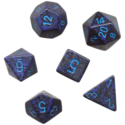Generic role-playing game system
| Part of a series on |
| Role-playing games |
|---|
 |
| Types |
| Movements & Traditions |
| Parts of Games |
| Participants |
| Lists |
| |
A generic or universal role-playing game system is a role-playing game system designed to be independent of campaign setting and genre. Its rules should, in theory, work the same way for any setting, world, environment or genre.
History
[edit]The term "generic" has been used since the earliest days of gaming to describe a system that can be used for any type or style of game. There is some dispute among role-playing enthusiasts on when the concept of a generic system originated and which was the first one published.
According to Shannon Appelcline, Chaosium's Basic Role-Playing (BRP, 1980), was the first generic role-playing system.[1] BRP was a "cut-down" version of Chaosium's RuneQuest role-playing game and formed the foundation for the Stormbringer RPG, and was also adopted for Call of Cthulhu, the first horror role-playing game.[1] The publication of GURPS (Generic Universal Role-Playing System, 1986) as a completely setting-independent game and its commercial and creative success added credence to the movement. The development of the Hero System (1989) from the superhero role-playing game Champions[1] also had a profound influence in popularizing the concept.
It truly became a dominant subject in RPG design with the release of the Third Edition of Dungeons & Dragons (2000) and the d20 System along with the creation of the Open Gaming License (OGL).
Definition
[edit]The Fuzion 5.02 rules uses the term "generic" to describe its basic ruleset as separate from its Champions and Interlock forerunners.[2] In the second paragraph of the introduction to GURPS 3rd Edition the authors define "generic" as a means to satisfy players and game masters of many styles of play and feel for rules.[3] This is repeated in the updated 4th edition rules along with acknowledgments to Champions as the first truly flexible character creation system.[4]
Some d20 derivative, such as Green Ronin Publishing's Mutants & Masterminds and True20 Adventure Roleplaying,[5] are presented as fully generic systems.
Other influential generic systems
[edit]- Blacksburg Tactical Research Center's EABA
- Eden Studios' Unisystem
- Evil Hat Productions' FATE rpg
- Grey Ghost Press' FUDGE
- Guardians of Order's Tri-Stat System
- Pinnacle Entertainment Group's Savage Worlds
- R. Talsorian Games's Fuzion and Interlock System
- West End Games's D6 and Masterbook systems
References
[edit]- ^ a b c Shannon Appelcline (2006-09-04). "Brief History of the Game #3". RPGnet. Retrieved 2007-09-14.
- ^ Fuzion (1998-08-03). Fuzion 5.02. Fuzion Lab Groups. p. 42. Archived from the original on 2000-12-18. Retrieved 2008-04-24.
- ^ Jackson, Steve (2004-01-19). GURPS Basic Set 3, Revised. Steve Jackson Games. ISBN 1-55634-357-4.
- ^ Jackson, Steve; Sean Punch; David Pulver (2004-08-21). GURPS Basic Set: Characters 4. Steve Jackson Games. p. 336. ISBN 1-55634-729-4.
- ^ Richeson, Christopher (2006-06-23). "Review of True20 Adventure Roleplaying". RPGnet. Retrieved 2008-04-24.


 French
French Deutsch
Deutsch